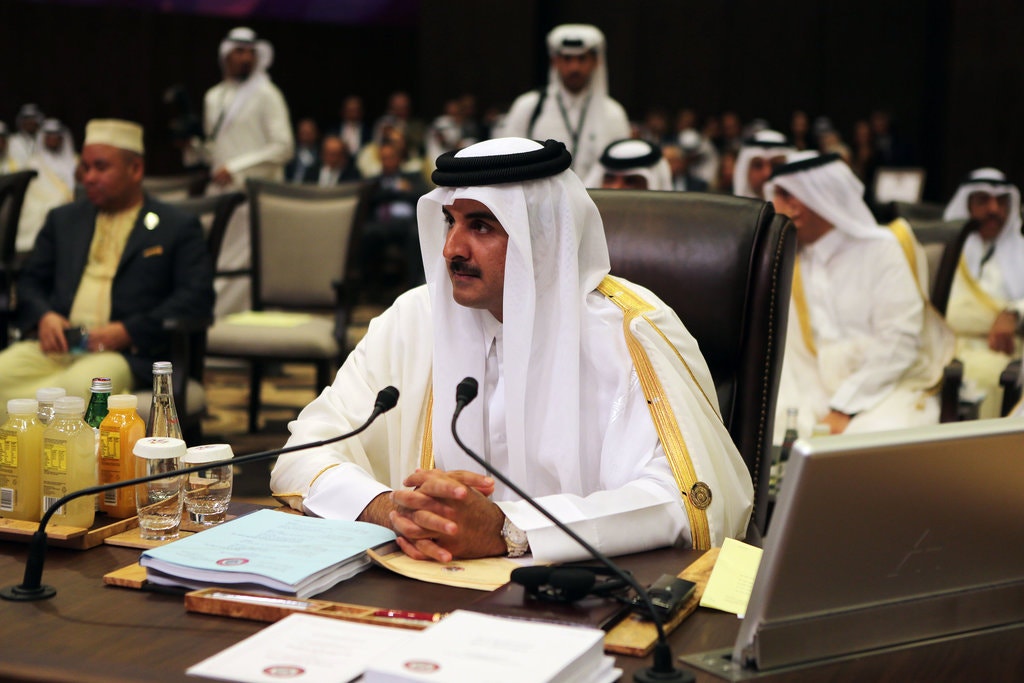June 6, 2017 New York Times
In the opaque world of Arab diplomacy, things are never quite as they seem. On the surface, the reason Saudi Arabia, Bahrain, the United Arab Emirates and Egypt cut air, land and sea travel to the small peninsula state of Qatar this week was straightforward enough: The gulf states accused their emirate neighbor of giving succor to Islamist extremism, including the so-called Islamic State.
President Donald Trump has since endorsed this view via Twitter, adding that he discussed the “funding of radical ideology” during his recent visit to the Middle East. The gulf leaders he met with were all “pointing to Qatar,” he said when attributing blame.
Despite the convenience of this narrative, there are other forces at play. In reality, Qatar has been ostracized by its “brotherly” neighbors, as the language of regional diplomacy has it, for not kowtowing to the collective vision for the Middle East now largely shared by the United States, Saudi Arabia and Israel.
There is no doubt that the al-Thani clan, which rules the emirate from its capital, Doha, has funded militants fighting the regime of president Bashar al-Assad in Syria and meddled in the internal affairs of other Arab nations through its support of the Muslim Brotherhood, notably in Egypt. But these are relative sideshows in a broader regional game. Even allowing for the seeming hypocrisyof Saudi Arabia’s making such accusations, given its history of backing Sunni militant groups in Syria and its military interventionin Yemen, the allegations are so well known as to be tired at this point.

The more heinous sin for which Doha is being punished is its willingness to acknowledge that Iran occupies a position as an important regional power and that political Islamists like Hamas and Hezbollah have a role to play in determining the future of the Middle East. To put it bluntly, Qatar is being penalized for refusing to accept the status quo of the past 40 years, and for daring to challenge the conventional wisdom in the gulf that bashing Tehran, buttressing military strongmen and suppressing political Islamism are the right path for the region.
For the governments in Saudi Arabia, United States and Israel, such divergent thinking is not merely undesirable but heretical. While these three powers pay lip service to the idea of peace in the Middle East, narrow self-interest increasingly drives their thinking. And this shortsighted calculation underpins their unlikely-seeming alliance.
This is not to paint Qatar as an innocent party that deserves no criticism. Doha’s posture since the Arab Spring as a champion of political reform stands in marked contrast to the near-feudal nature of its own system of governance, whereby the ruling al-Thani family and some 200,000 Qataris hold sway over a population of about two million foreign residents.
The grim plight of the migrants working on construction projects for the 2022 World Cup has received wide coverage, but there is a history of other abuses that have received less publicity. In one case, more than 5,000 members of one clan have since 2004 had their citizenship revoked by the government amid allegations that some family members had been involved in a Saudi-based plot to overthrow the current emir’s father in 1996.
To justify this latest severing of diplomatic ties with Doha, Saudi Arabia cited recent comments praising Iran that were attributed to the Qatari emir, Sheikh Tamim bin Hamad al-Thani. Qatar has dismissed these allegations as “fake news” and part of a wider hacking attack on its national news service.
These tensions are not new. Qatar’s views on Iran and groups like Hamas and Hezbollah are not the result of a sudden conversion. To some extent, Qatar — which is home to some 10,000 American troops at the Al Udeid Air Base — took a lead from the Obama doctrine of engagement with Iran, which led to the nuclear deal concluded in 2015. This diplomatic alignment and the presence of the strategically important air base meant that Doha enjoyed a measure of American protection as it pursued its own regional agenda.
That has changed with the arrival of a new and very different administration in Washington. Since Mr. Trump has surrounded himself with a coterie of advisers obsessed with the twin threats of Iranian influence and “radical Islamic terror,” it makes sense that the Saudis decided this was the moment to act. Punishing Qatar and isolating Iran also fit with the Israeli government’s assessment of its strategic interests, as it confronts Hezbollah forces to its north and Hamas in Gaza on its south-western border.
Caught out by the United States’ new orientation, Doha is learning there is a price to pay for questioning the established orthodoxy.
Post a Comment